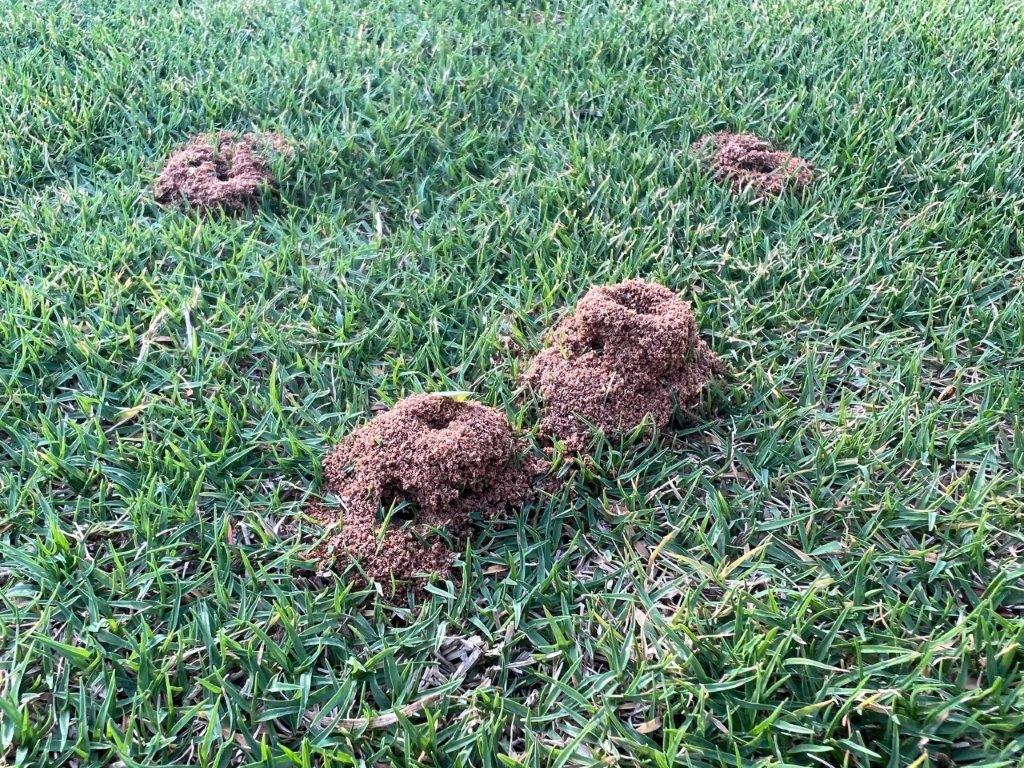Ants in lawns
Author: Stefan Palm Date Posted: 1 May 2024
With the extended dry weather that we are experiencing in Adelaide at the moment, we're finding that a lot of customers are talking about ants. If you've noticed higher than usual levels of ants in your lawn, it's because they love the dry!
Key takeaways from this blog:
- Ants love dry soil - expect to see more of them during periods of dry weather
- Ants are good for your lawn and the ecosystems around your garden
- Ants won't damage your lawn and don't need to be controlled unless numbers get too high or their mounds become too unsightly
- They can be controlled in lawns using low toxicity level chemicals such as Yates Complete (formally known as Baythroid)
So, what do you do if you have excessive ants and ant mounds in your lawn?
From time to time, you may have noticed ant mounds appearing in your lawn. Ant mounds can be unsightly, especially if you get a lot of them, and then t here is the question - Can ants harm your lawn?
here is the question - Can ants harm your lawn?
Most people who have ants in their lawn don't want them there, mostly because of the potential to bite and irritate and because they create unsightly mounds. If that's you, I understand your frustration - there have been many times when I have had ants in my own lawn. While you're probably interested in reading this blog to discover ways of removing them, let me start by telling you that ants are, in a lot of ways, beneficial to your lawn.
Benefits of ants
Ants are seen in many cases as “bio-indicators”. Scientists often use them as a means to test the health of an ecosystem. In other words, the presence of ants can equal a healthy environment. Ants naturally aerate the soil with their network of tunnels and break down organic material on the soil surface. They act as little rotary hoes in your soil, redistributing nutrients and recycling all sorts of things back into your soil. On top of this, ants are natural scavengers. They will consume unwanted materials such as food scraps and dead insects, turning them back into fertiliser. On top of this, they play an important role in the food chain, being a food source for birds, other beneficial insects, lizards and some mammals.
Downsides of ants
Of the few thousand ant species that exist in Australia, only a few are considered pests. The small Black House ants and Coastal Brown ants that develop large colonies in and around houses are of the most concern. Of course, there are other species that can create problems, such as white ants. The management of white ants is outside the scope of this blog. If you suspect you have white ants, contact your local pest controller.
Ants can become a problem when they develop into large colonies. Issues include the tendency for some species to bite, the surface mounds that they create and the undermining effect they can have on paved surfaces. As ants are continually on the hunt for food, they can find their way into your house with their voracious appetite for all things sweet and sticky.
Will ants damage your lawn?
The short answer to this is no. As far as your lawn and garden are concerned, they are more helpful than problematic. They don't eat any living part of the lawn and don't interfere with the rootzone like black beetle larvae do, so in that way, they won't physically damage your lawn and won't cause any dead spots to appear.
What they will do is create mounds. The larger the colony gets, the more mounds you'll see.
Controlling ants
If you have an ever-increasing colony that you can no longer tolerate, you may need to consider some control options. It's important to think about why you want to control them. If it's simply a case of a few mounds appearing in your lawn, then consider simply brushing the mounds away with an outdoor broom. Yes, the mounds will return, and you will have to repeat the exercise, but this is a small price to pay, considering the good the ants do.
If the colony has become so large that they causing problems that you can't tolerate, you may need to consider chemical control. I'd always advise you to be very careful when it comes to chemical use in the lawn and garden. Research the products you intend to use carefully so that you understand the impact on other beneficial insects in the garden. One I can recommend is Yates Complete (formally known as Baythroid). It's a synthetic pyrethrum, and while it is effective on ants, it is likely to represent the least toxic option. You spray it over your lawn and water it in straight away, meaning it won't hang around on the surface, which is great for a low-contact option for kids and pets. Other less toxic options include boric acid-type products such as borax. These can be targeted directly to nests.
Often seen only as pests, they are, in most cases, beneficial insects to have in your lawn and garden, playing a helpful role in creating a diverse and healthy ecosystem. Next time you see an ant mound in your lawn and garden, instead of just cursing them and removing the mound, I'd encourage you to consider them as partners in gardening, helping you to create a healthy lawn and garden. Control them only if you need to.
